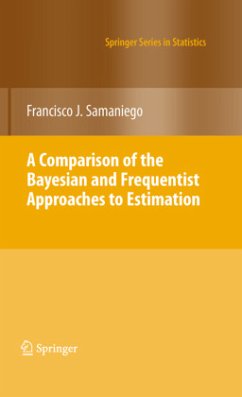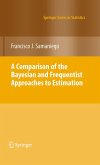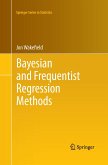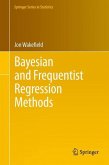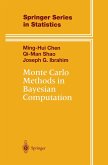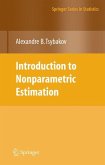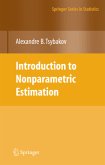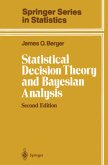The main theme of this monograph is "comparative statistical inference. " While the topics covered have been carefully selected (they are, for example, restricted to pr- lems of statistical estimation), my aim is to provide ideas and examples which will assist a statistician, or a statistical practitioner, in comparing the performance one can expect from using either Bayesian or classical (aka, frequentist) solutions in - timation problems. Before investing the hours it will take to read this monograph, one might well want to know what sets it apart from other treatises on comparative inference. The two books that are closest to the present work are the well-known tomes by Barnett (1999) and Cox (2006). These books do indeed consider the c- ceptual and methodological differences between Bayesian and frequentist methods. What is largely absent from them, however, are answers to the question: "which - proach should one use in a given problem?" It is this latter issue that this monograph is intended to investigate. There are many books on Bayesian inference, including, for example, the widely used texts by Carlin and Louis (2008) and Gelman, Carlin, Stern and Rubin (2004). These books differ from the present work in that they begin with the premise that a Bayesian treatment is called for and then provide guidance on how a Bayesian an- ysis should be executed. Similarly, there are many books written from a classical perspective.
From the reviews:
"Intended to be broad, including an advanced undergraduate audience ... and the book would more likely benefit more senior readers. A Comparison is pleasant to read, written in a congenial style ... and the decision-theoretic background is well-set. Its self-declared purpose ... is commendable in that an objective comparison of Bayesian versus frequentist estimators should appeal to anyone." (Christian P. Robert, International Statistical Review, Vol. 79 (1), 2011)
"Samaniego presents a unique approach to comparing the Bayesian and frequentist schools of thought. ... provides extensive overviews of the decision-theoretic framework, the frequentist approach to estimation, and the Bayesian approach to estimation. I found the coverage of these topics strong and the writing interesting. ... I can see A Comparison of the Bayesian and Frequentist Approaches to Estimation serving the needs of a special topics course or serving nicely as a reference book for a more general course on Bayesian statistics or mathematical statistics." (Andrew Neath, Journal of the American Statistical Association, Vol. 106 (496), December, 2011)
"The main theme of the monograph is 'comparative statistical inference'. The author provides ideas and examples which can assist a statistician in comparing the performance one can expect from using either Bayesian or classical solutions in estimation problems. ... contains a summary and synthesis of the main themes of the monograph and provides a general set of conclusions and recommendations regarding the types of problems in which the Bayesian approach to estimation stands to provide reliable and preferred solutions ... ." (Alicja Jokiel-Rokita, Mathematical Reviews, Issue 2011 g)
"Francisco J. Samaniego's A Comparison of the Bayesian and Frequentist Approaches to Estimation is an extremely well written book. Filled with amusing wordplay and clear descriptions, the book lays out acase for both Bayesian and frequentist estimators. ... easily approachable to graduate students and has exercises following each section ... . an engaging, quick read that acquaints the reader with ways to produce and judge estimators for many problems. ... a nice overview for those seeking a framework for comparison of these estimators." (Elizabeth Ben Ward, SIAM Review, Vol. 54 (1), 2012)
"Samaniego explores some of the traditional approaches to comparing Bayes and frequentist estimators. ... He includes appropriate references for the reader who wishes to study the problems in more detail than given in the book. ... This book is very worthwhile because it will stimulate research, thought, and discussion about its subject matter and related issues. In conclusion Samaniego invites the reader to: 'Add your imprint to this work! You are cordially and enthusiastically invited to the party.'" (Marvin H. J. Gruber, Technometrics, Vol. 53 (3), August, 2011)
"The book under review is addressed to the audience of academics and practitioners who are open to using either frequentist or Bayesian methods in the considered problems ... . It will be appropriate as a text either for an advanced undergraduate course or for a graduate-level course or seminar. The book consists of 12 chapters and an Appendix." (Joseph Melamed, Zentralblatt MATH, Vol. 1204, 2011)
"Intended to be broad, including an advanced undergraduate audience ... and the book would more likely benefit more senior readers. A Comparison is pleasant to read, written in a congenial style ... and the decision-theoretic background is well-set. Its self-declared purpose ... is commendable in that an objective comparison of Bayesian versus frequentist estimators should appeal to anyone." (Christian P. Robert, International Statistical Review, Vol. 79 (1), 2011)
"Samaniego presents a unique approach to comparing the Bayesian and frequentist schools of thought. ... provides extensive overviews of the decision-theoretic framework, the frequentist approach to estimation, and the Bayesian approach to estimation. I found the coverage of these topics strong and the writing interesting. ... I can see A Comparison of the Bayesian and Frequentist Approaches to Estimation serving the needs of a special topics course or serving nicely as a reference book for a more general course on Bayesian statistics or mathematical statistics." (Andrew Neath, Journal of the American Statistical Association, Vol. 106 (496), December, 2011)
"The main theme of the monograph is 'comparative statistical inference'. The author provides ideas and examples which can assist a statistician in comparing the performance one can expect from using either Bayesian or classical solutions in estimation problems. ... contains a summary and synthesis of the main themes of the monograph and provides a general set of conclusions and recommendations regarding the types of problems in which the Bayesian approach to estimation stands to provide reliable and preferred solutions ... ." (Alicja Jokiel-Rokita, Mathematical Reviews, Issue 2011 g)
"Francisco J. Samaniego's A Comparison of the Bayesian and Frequentist Approaches to Estimation is an extremely well written book. Filled with amusing wordplay and clear descriptions, the book lays out acase for both Bayesian and frequentist estimators. ... easily approachable to graduate students and has exercises following each section ... . an engaging, quick read that acquaints the reader with ways to produce and judge estimators for many problems. ... a nice overview for those seeking a framework for comparison of these estimators." (Elizabeth Ben Ward, SIAM Review, Vol. 54 (1), 2012)
"Samaniego explores some of the traditional approaches to comparing Bayes and frequentist estimators. ... He includes appropriate references for the reader who wishes to study the problems in more detail than given in the book. ... This book is very worthwhile because it will stimulate research, thought, and discussion about its subject matter and related issues. In conclusion Samaniego invites the reader to: 'Add your imprint to this work! You are cordially and enthusiastically invited to the party.'" (Marvin H. J. Gruber, Technometrics, Vol. 53 (3), August, 2011)
"The book under review is addressed to the audience of academics and practitioners who are open to using either frequentist or Bayesian methods in the considered problems ... . It will be appropriate as a text either for an advanced undergraduate course or for a graduate-level course or seminar. The book consists of 12 chapters and an Appendix." (Joseph Melamed, Zentralblatt MATH, Vol. 1204, 2011)

